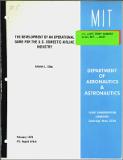The development of an operational game for the U.S. domestic airline industry
Author(s)
Elias, Antonio L.
DownloadFTL_R_1978_05.pdf (9.023Mb)
Other Contributors
Massachusetts Institute of Technology. Flight Transportation Laboratory
Metadata
Show full item recordAbstract
Introduction: The use of computer simulations to analyze large complex systems is now a well-established technique. By combining detailed numerical models of each component of the system, the behavior of the entire system can be simulated, observed, and analyzed; some examples of systems that have been successfully designed and analyzed by means of computer simulations are communications networks, the Microwave Landing Systems (MLS) that competed for the ICAO standard, and many aircraft and spacecraft, such as Apollo and the Space Transportation System ("Space Shuttle"). Attempts to simulate systems that involve human decisionmaking (principally economic and economy-related systems) have not been so successful. The difficulty in modeling an individual's decision-making process: leads to the impossibility of fully modeling such systems, short of including a human element in the simulation itself. This is precisely the essence of the gaming approach to system simulation a number of "players" (properly called "game participants") drive, with their decisions, numerical models of the other components of the system under consideration. This effort is motivated by the author's belief that research on domestic air transportation may benefit from the use of such a game for the following reasons: a) There is a significant number of mathematical models developed or in development about elements of its operations, which have not been integrated. b) The industry is reaching a turning point, namely deregulation, which increases the relative importance of the human decision-making element over a wider range of options. The effort undertaken in past years to develop and refine mathematical models for the airline industry, was made possible in part by the wealth of numerical data available. In their unique position between private industry and the public utilities, the airlines have been forced to keep and make public a staggering amount of data. The high technology environment that permeates the industry has enhanced both the quantity and quality of this data gathering effort, and the uses of this data for model-building (and analytical) purposes. These models are highly interrelated, but in general are used individually by making simple assumptions about other elements of the system. Thus, sophisticated demand models assume simple statistical supply functions, supply models assume non-competitive environments, etc. A computer simulation, such as the one required for this game, seems to be the ideal way of integrating many of these models in a coherent fashion, while the gaming dimension acts as a surrogate for the unmodelable human decision-making component. One of the consequences of the current trend towards deregulation in the air transportation industry is an increase in the freedom and range of management decisions. This in turn increases the relative importance of the human decision-making element in the total environmental uncertainty in which the industry must operate. The difficulty in modeling the individual decision-making process indicates a gaming approach to systems analysis.
Description
Also issued as a Ph. D. thesis, Massachusetts Institute of Technology, Dept. of Aeronautics and Astronautics, 1979 February 1979 Includes bibliographical references (p. 199-202)
Date issued
1979Publisher
Cambridge, Mass. : Massachusetts Institute of Technology, Flight Transportation Laboratory, [1979]
Other identifiers
05809742
Series/Report no.
FTL report (Massachusetts Institute of Technology. Flight Transportation Laboratory) ; R78-5
Keywords
Airlines, Aeronautics, Commercial, Games of strategy (Mathematics), Mathematical models, United States